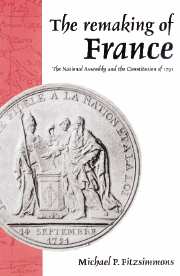7 - Rallying to the new ideal of the polity
Published online by Cambridge University Press: 14 October 2009
Summary
At each proclamation, cries of “Long live the constitution, the nation and the king” made themselves heard everywhere. The purest satisfaction was expressed on the face of every individual who witnessed this majestic ceremony.
Affiches d'Angers, September 27, 1791, describing the ceremony in that town celebrating Louis's acceptance of the ConstitutionAs the year 1791 began, the contrast with the beginning of the previous year could not have been greater. The year 1790 had begun in an atmosphere of deep unease, with most of the old institutions of the kingdom suppressed but the ones destined to supplant them not yet in place. At the beginning of 1791, however, the new departmental administrations were functioning smoothly, as were the district tribunals – except in Paris, where they would open in January, 1791 – and the establishment of the new institutions created a deep sense of pride and accomplishment. Furthermore, at the beginning of 1790 there had been much uncertainty regarding Louis's attitude toward the Revolution, stemming especially from the arrest of the marquis de Favras. Louis's visit to the National Assembly on February 4 had dissipated these doubts, however, and the goodwill generated by that visit, as well as by the Fête de la Fédération of 1790, carried over well into 1791. Few in the nation doubted that Louis had completely aligned himself with the Revolution, and that the nation and the monarch were united in a sense of common purpose.
- Type
- Chapter
- Information
- The Remaking of FranceThe National Assembly and the Constitution of 1791, pp. 217 - 246Publisher: Cambridge University PressPrint publication year: 1994



